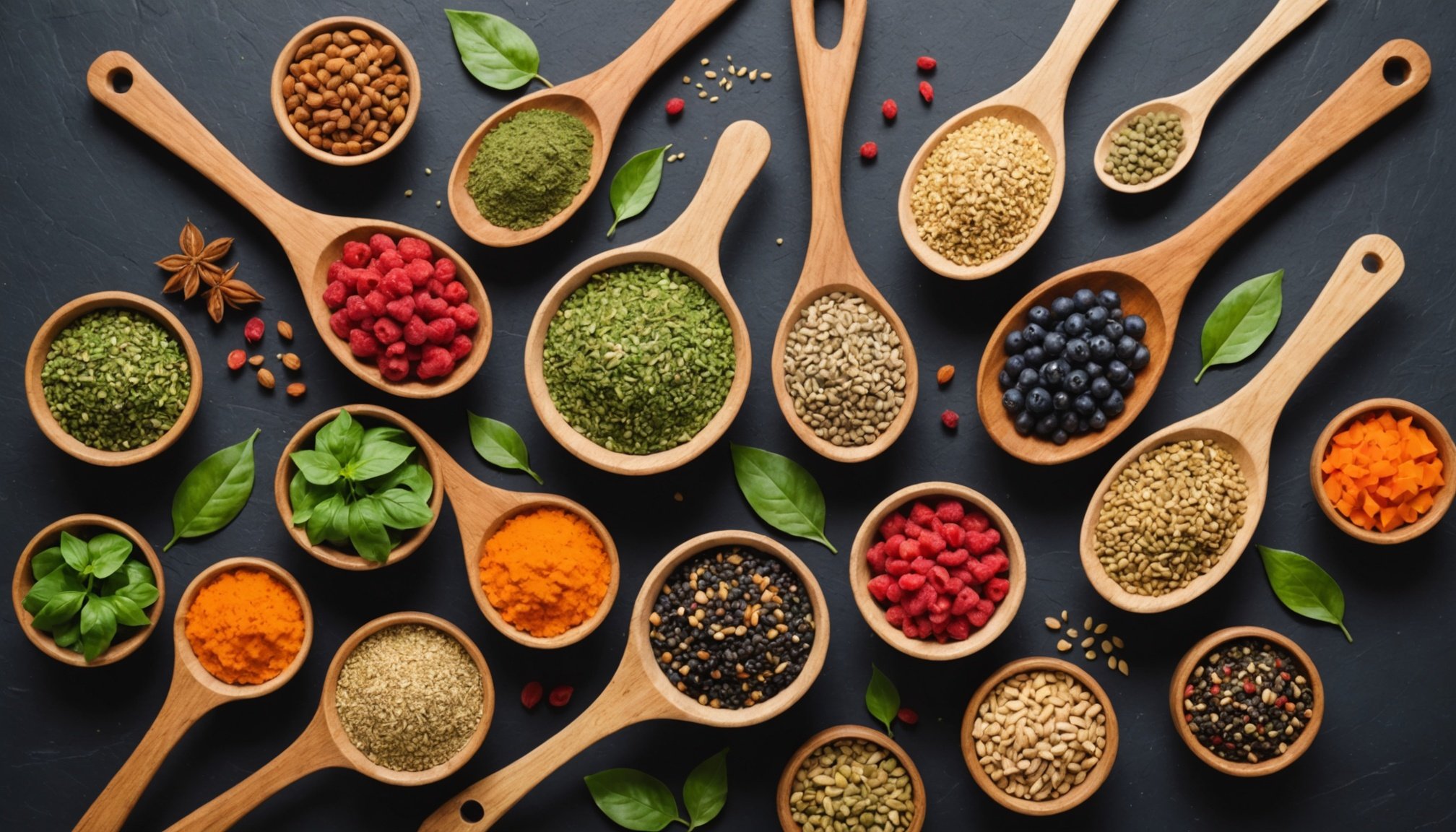UK-grown superfoods offer more than just vibrant colors and unique flavors; they are packed with nutrients that can enhance your overall well-being. This exploration reveals how these local ingredients can support health while benefiting regional ecosystems. Discover how incorporating British superfoods into your diet can lead to improved energy, better digestion, and even enhanced mood. Embrace the natural power of your own backyard and transform your health through thoughtful, delicious choices.
Overview of UK-Grown Superfoods
Superfoods are nutrient-rich foods considered especially beneficial for health and well-being. UK superfoods are gaining traction due to their local sourcing, which supports sustainable practices and reduces carbon footprints. These foods are celebrated for their high concentrations of vitamins, minerals, and antioxidants, which contribute to various health benefits, such as improved immunity and reduced inflammation.
Have you seen this : Unlocking Better Sleep: The Impact of Aromatherapy on Insomnia in UK Adults
In the UK, the importance of sourcing superfoods locally cannot be overstated. It not only supports the local economy but also ensures fresher produce. By choosing locally grown options, consumers can enjoy foods at their peak nutritional value. Additionally, local sourcing often means fewer preservatives are needed, maintaining the integrity of these nutrient-packed foods.
The increasing popularity of UK-grown superfoods is attributed to the growing awareness of their health benefits and the environmental advantages of eating local. Foods such as kale, berries, and even seaweed are becoming staples in British diets. As more people seek to improve their health and reduce their environmental impact, the demand for these superfoods continues to rise. This trend highlights a shift towards more sustainable and health-conscious eating habits in the UK.
Also to see : Unlocking Calm: Top Stress Relief Strategies Tailored for UK University Students
Nutritional Profiles of Popular UK Superfoods
Understanding the nutritional value of UK superfoods can empower consumers to make informed dietary choices. Among the top superfoods, kale stands out for its impressive nutrient density. It is rich in vitamins A, C, and K, and provides essential minerals like calcium and potassium, contributing to bone health and immune support.
Blueberries, another popular choice, are celebrated for their high antioxidant content, particularly anthocyanins, which support heart health and cognitive function. They are also a good source of vitamin C and fibre, promoting skin health and digestion.
In comparison, beetroot offers a unique nutritional profile, packed with nitrates that can improve blood flow and lower blood pressure. It is also a great source of folate, essential for cell growth and function.
When comparing these superfoods, each offers distinct benefits that cater to different health needs. Kale is ideal for those seeking a vitamin-rich diet, blueberries for antioxidant support, and beetroot for cardiovascular health. By incorporating a variety of these superfoods, individuals can enjoy a balanced intake of vitamins and minerals, enhancing overall well-being.
Health Benefits of UK-Grown Superfoods
Exploring the health advantages of UK-grown superfoods reveals their potential to enhance well-being significantly. Each superfood offers unique wellness benefits, backed by scientific studies and expert opinions.
For instance, kale's high vitamin K content contributes to bone health, supported by research indicating its role in calcium absorption and bone mineral density. Similarly, blueberries, rich in antioxidants like anthocyanins, have been linked to improved heart health and cognitive function. Studies suggest that regular consumption may reduce the risk of heart disease and improve memory.
Beetroot, another UK superfood, is renowned for its nitrate content, which can lower blood pressure and improve athletic performance. Research supports these claims, showing that beetroot juice can enhance endurance and reduce oxygen consumption during exercise.
Experts highlight the long-term effects of incorporating these superfoods into a balanced diet. Consistent consumption can lead to sustained energy levels, improved digestion, and reduced inflammation. These benefits underscore the importance of variety and moderation in diet, allowing individuals to harness the full spectrum of nutrients these superfoods offer.
By choosing UK-grown options, consumers not only support local agriculture but also benefit from fresher, nutrient-dense produce.
Incorporating UK Superfoods into Your Diet
Integrating UK-grown superfoods into your meals can be both simple and rewarding. Here are some practical dietary tips to enhance your nutrition effortlessly.
Start by incorporating superfoods into your daily meals. For example, add a handful of blueberries to your morning oatmeal or smoothie. This not only boosts antioxidant intake but also adds a burst of natural sweetness. Meal planning plays a crucial role here. Plan your weekly meals to include a variety of superfoods like kale, beetroot, and seaweed, ensuring a balanced nutrient intake.
Consider these simple recipes: A kale and beetroot salad with a lemon-tahini dressing makes a refreshing lunch. For dinner, try a seaweed and quinoa stir-fry, providing a unique flavour and nutrient profile. These dishes are not only easy to prepare but also packed with vitamins and minerals.
Meal prepping with superfoods can save time and ensure you always have healthy options available. Prepare large batches of superfood-rich dishes and store them in portions. This strategy helps maintain a nutritious diet even on busy days, making it easier to enjoy the benefits of UK-grown superfoods regularly.
Sustainability and Local Sourcing of Superfoods
Embracing sustainability in our dietary choices can have profound benefits, especially when it comes to consuming locally grown superfoods. By supporting local agriculture, we not only reduce the carbon footprint associated with transporting food over long distances but also contribute to the vitality of local ecosystems. This practice ensures fresher produce, preserving the nutritional integrity of these nutrient-dense foods.
Sustainable farming practices play a pivotal role in this process. They focus on maintaining soil health, conserving water, and reducing chemical inputs, which collectively enhance the quality of the produce. This approach not only benefits the environment but also supports human health by reducing exposure to harmful pesticides and promoting biodiversity.
Community-supported agriculture (CSA) initiatives further amplify these benefits. By participating in CSAs, consumers can directly support local farmers, ensuring a steady demand for superfoods and fostering a sense of community. This model encourages the cultivation of a diverse range of crops, which is crucial for maintaining a resilient food system.
Incorporating locally sourced superfoods into your diet is a practical step towards a more sustainable lifestyle. It empowers consumers to make choices that are beneficial for both their health and the planet.
Common Myths About Superfoods
Misunderstandings surrounding superfoods can lead to unrealistic expectations about their benefits. One prevalent superfood misconception is that they are a cure-all solution for health issues. While they are nutrient-rich, they should not replace a balanced diet. Instead, they complement regular foods by providing additional vitamins and minerals.
Another myth suggests that superfoods are exotic and expensive. In reality, many affordable and locally sourced options, like kale and beetroot, offer similar benefits. These foods are accessible and can be easily incorporated into everyday meals, debunking the notion that superfoods are exclusive to specific regions or economic classes.
The idea that consuming superfoods alone leads to immediate health improvements is also misleading. Health benefits arise from consistent dietary habits and not from isolated consumption of specific items. Thus, it's crucial to focus on a balanced diet rather than solely relying on superfoods.
Understanding the difference between superfoods and regular foods is essential. Superfoods are simply foods with higher concentrations of nutrients, not magical ingredients. Emphasising a varied diet ensures you receive a wide range of nutrients, promoting overall well-being and preventing nutrient deficiencies.
Success Stories and Testimonials
Real-life benefits of UK-grown superfoods are evident through various user experiences and testimonials. Individuals across the UK have shared their success stories, highlighting significant health improvements.
One notable case involves Jane, a 45-year-old from Bristol, who incorporated kale and blueberries into her diet. She reported enhanced energy levels and improved digestion, attributing these changes to the nutrient-rich superfoods. Jane's story is a testament to the transformative power of these foods.
Nutritionists and dietitians also vouch for the efficacy of UK superfoods. Dr. Emily Carter, a renowned dietitian, often recommends beetroot to her clients for its cardiovascular benefits. She notes that consistent consumption has led to noticeable improvements in her clients' blood pressure and overall heart health.
The community impacts of promoting superfood consumption are profound. Local initiatives encourage the integration of superfoods into school meals, leading to healthier eating habits among children. These efforts not only boost individual health but also foster a culture of wellness within communities.
By sharing these real-life benefits and user experiences, the positive influence of UK-grown superfoods becomes evident, inspiring others to explore these nutritious options.
Future Trends in UK Superfoods
The landscape of UK superfoods is evolving, with exciting innovations in cultivation and research shaping future health trends. As the demand for nutrient-rich foods grows, researchers are exploring emerging superfoods that could soon become staples in British diets.
One trend is the development of new cultivation techniques to enhance the nutritional profiles of traditional crops. Innovations such as vertical farming and hydroponics are being utilised to grow superfoods like kale and berries more sustainably and efficiently. These methods not only improve yield but also reduce the environmental impact, aligning with the increasing consumer preference for eco-friendly options.
Predictions for the future of superfoods in the UK market suggest a rise in local farming initiatives. These initiatives aim to introduce novel superfoods, such as sea buckthorn and blackcurrants, known for their high antioxidant content. By focusing on indigenous crops, these efforts support biodiversity and provide consumers with fresh, locally sourced options.
As these health trends continue to evolve, the UK market is poised to embrace a wider variety of superfoods. This shift not only promises enhanced nutritional benefits but also fosters a more resilient and sustainable food system.











